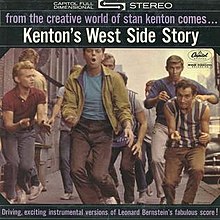Kenton's West Side Story
| Kenton's West Side Story | ||||
|---|---|---|---|---|
 |
||||
| Studio album by Stan Kenton | ||||
| Released | Stan Kenton's West Side Story - 1961 original LP - 1994 re-issue CD |
|||
| Recorded | - March 15/16, 1961 April 11, 1961 |
|||
| Studio | Goldwyn Sound Stage #5 in Hollywood, CA | |||
| Genre | Jazz, Big band, instrumental, Broadway show | |||
| Length | 39:13 | |||
| Label | Capitol | |||
| Producer | -All original LP recordings by Lee Gillette -Re-issued CD by Ted Daryll |
|||
| Stan Kenton chronology | ||||
|
||||
|
Capitol ST-1609 (LP) Creative World ST-1007 (LP) Capitol Jazz 7243 8 29914 2 7 (CD) |
||||
| Professional ratings | |
|---|---|
| Review scores | |
| Source | Rating |
|
Billboard Magazine October 16, 1961 |
(Kenton and Reed Break Big) #4 National Breakouts) |
|
Billboard Magazine February 3, 1962 |
#52 of top 150 LPs (mono), #52 of top 50 LPs (stereo) |
|
Billboard Magazine September 11, 1961 |
Pop LP's Strong Sales Potential |
| Allmusic |
|
| Down Beat | |
| The Rolling Stone Jazz Record Guide | |
Kenton's West Side Story is the Grammy Award winning album for the Best Jazz Performance - Large Group (Instrumental) category in 1962. It consists of jazz arrangements of musical numbers from Leonard Bernstein's West Side Story without vocals. The LP was recorded by Stan Kenton and his orchestra in early 1961 and released quickly so to take advantage of the popularity of the musical's 1957 Broadway production and subsequent 1961 movie release. This was Kenton's first Grammy honor and he won again the next year, 1963, in the same category, Best Large Jazz Ensemble Album, for Adventures In Jazz. The Kenton's West Side Story LP also charted for 26 weeks starting in October 1961, peaking at #16 in November on the Billboard Magazine Hot 100 albums chart.
The Kenton orchestra had been on a slow decline in sales and popularity in the late 1950s with having to compete with newer, popular music artists such as Elvis Presley, Bobby Darin and The Platters. The nadir of this decline was around 1958 and coincided with a recession that was effecting the entire country. There were far fewer big bands on the road and live music venues were hard to book for the Kenton orchestra. The band would end 1959 beaten up by poor attendance at concerts and having to rely far more on dance halls than real jazz concerts. The band would reform in 1960 with a new look and new sound, West Side Story would be one of the first 'mellophonium' albums to be part of an upsurge in Kenton's popularity.
Lee Gillette and the other Capitol executives were pushing Kenton towards more commercially viable recording projects in the early 1960s. Kenton made concessions to this though these were not his favorites records to make; one very happy outcome of these practical commercial choices was the West Side Story LP. Johnny Richards was chosen as the arranger for the project and was a logical choice seeing his success with Cuban Fire! and having helped design the mellophonium. Johnny Richards' music was substantial---"steel and concrete," Kenton called it. "Johnny was probably the best schooled, musically, of all of us put together." The handling of Bernstein's crowning achievement as a Broadway composer by the Kenton band was going to take a very experienced and adept arranger.
...
Wikipedia
